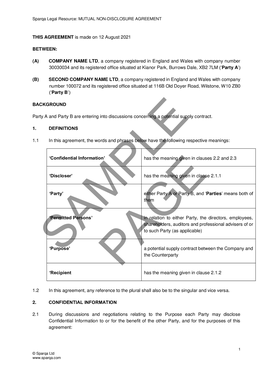 A non-disclosure agreement (NDA) is a legal agreement that prevents the misuse of your confidential or sensitive information by others. You should consider using an NDA in any situation where you are planning to disclose information on your business to a third party, and it should be signed at the early stages of discussions. Terms that are included in a non-disclosure agreement will depend on the information you are trying to protect and whether it is a one-way or a mutual NDA.
A non-disclosure agreement (NDA) is a legal agreement that prevents the misuse of your confidential or sensitive information by others. You should consider using an NDA in any situation where you are planning to disclose information on your business to a third party, and it should be signed at the early stages of discussions. Terms that are included in a non-disclosure agreement will depend on the information you are trying to protect and whether it is a one-way or a mutual NDA.
One-way NDAs require confidentiality undertakings from the person you provide information to. Mutual NDAs include confidentiality undertakings given both by you and the recipient of confidential information.
You can find template NDAs at NDA (mutual) and NDA (one way). You can also purchase these templates as part of the Protecting IP and confidential information toolkit.
The purpose of an NDA
Your starting point before going into a meeting or negotiation should generally be to reveal as little information as is necessary to convey what your business delivers.
However, it is inevitable that in the course of a business meeting or commercial negotiations, you will be disclosing some valuable information about your business. You also need to keep in mind the possibility that discussions, even if they reach an advanced stage, may not conclude in a deal. Therefore, you will want to prevent the information being stolen or misused.
Protections against misuse of your information should be included in a non-disclosure agreement, normally giving you a legal claim against the recipient of the information who has breached the NDA. In particular, an NDA allows you to protect:
- intellectual property, including unregistered trade marks or designs and information on inventions which you have not yet patented;
- other information which is confidential or sensitive such as your business plan, know-how, financial information and customer and supplier lists; and
- details of the discussions between you and the person receiving information from you.
What is included in a non-disclosure agreement
Provisions that are included in a non-disclosure agreement will often depend on the information you are trying to protect and whether it is a one-way or a mutual NDA. You can find template NDAs at NDA (mutual) and NDA (one way). You can also purchase these templates as part of the Protecting IP and confidential information toolkit.
A well drafted NDA will typically include the following provisions:
- a clear definition of your business information which is being protected;
- agreement from the person receiving your information:
- only to use it for the specific purpose of your disclosure and not for any other reason;
- to keep it private and confidential and not to disclose it except as permitted under the NDA , so that you control who else will have access to the information;
- to keep confidential details of the discussions between the two of you;
- to return or destroy the information on demand; and
- if there is to be a time-limit on the NDA, what this should be. Although there is no hard and fast rule as to whether confidentiality undertakings in an NDA should be limited in time and, if they are, what the time-limit should be, recipients of NDAs will commonly ask for it to be limited.
Information typically excluded from protection under an NDA is:
- information which is already available to the public at large; or
- information which was lawfully in the recipient’s possession before being disclosed.
The reason for doing so is to avoid later arguments that the NDA is too wide and therefore not enforceable.
Disclosing information to someone who has not signed an NDA
If you have disclosed information to someone and do not have an NDA in place, it will be much more difficult to pursue that person for misusing the information already disclosed. You’ll need to prove that the information was confidential and received under an obligation of secrecy.
If the person you are dealing with refuses to sign an NDA, you’ll need to balance the potential benefits to your business of disclosing information versus the risks to your business of not having an NDA in place:
- You may decide that it is too big a risk without an NDA in place and not proceed any further with discussions.
- Alternatively, you may decide to go ahead with the meeting or negotiation but perhaps hold back some of the more sensitive information until you are comfortable with the person you are dealing with.
You should be aware that some institutions do not sign NDAs as a matter of policy – for example, crowdfunding platforms.
For further guidance on how to use NDAs, see our Q&A.
The content in this article is up to date at the date of publishing. The information provided is intended only for information purposes, and is not for the purpose of providing legal advice. Sparqa Legal’s Terms of Use apply.

Marion joined Sparqa Legal as a Senior Legal Editor in 2018. She previously worked as a corporate/commercial lawyer for five years at one of New Zealand’s leading law firms, Kensington Swan (now Dentons Kensington Swan), and as an in-house legal consultant for a UK tech company. Marion regularly writes for Sparqa’s blog, contributing across its commercial, IP and health and safety law content.






